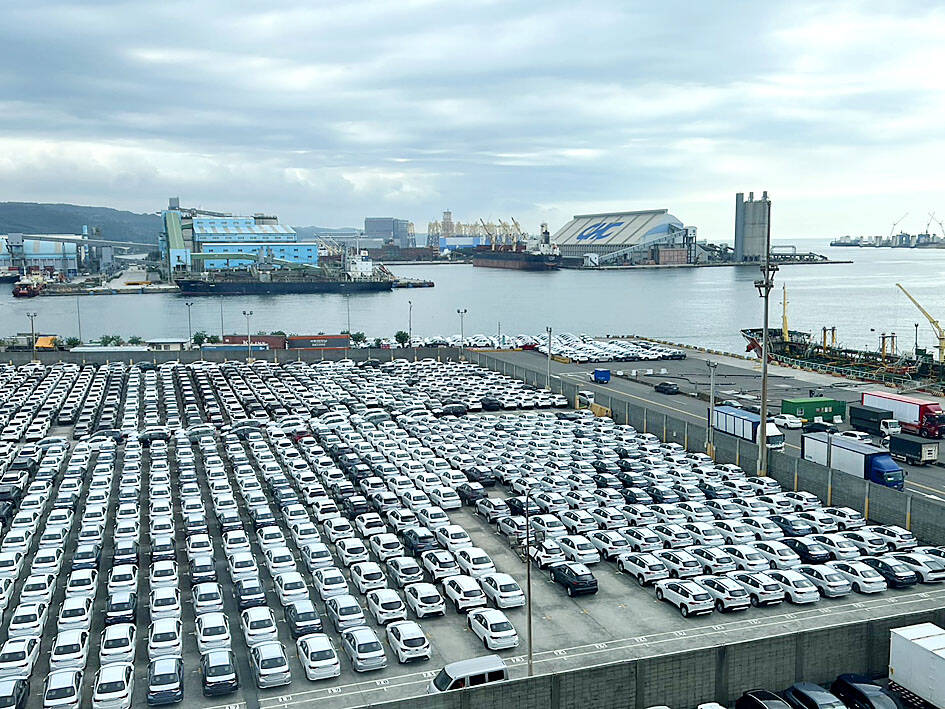New vehicle sales in Taiwan dipped 17 percent month-on-month last month, as buyers delayed purchases of new cars while they wait for the government to confirm the implementation date of new commodity tax incentives, online market researcher U-Car said in a report yesterday.
New car sales dropped to 29,460 units from 35,483 units in July, the second-lowest sales level this year, its data showed. The lowest was in February, when only 27,515 vehicles were sold.
On an annual basis, sales inched up 0.2 percent, the data showed.

Photo courtesy of a reader
The results stoked fears of gloomy car sales for the whole year, as the market is already weighed down uncertainty over US tariffs.
In the first eight months of this year, new car sales tumbled 14.2 percent year-on-year to 263,910 units.
Legislators on Friday gave the go-ahead to a new measure that extends commodity tax incentives to 2030 and widens the coverage to include buyers of small passenger vehicles with engine displacements of less than 2 liters.
The existing rules are to expire on Jan. 7 next year.
Car buyers would be eligible for a NT$5,000 commodity tax reduction when buying a new car. Another NT$5,000 cut could be stacked on if they are buying a new car to retire an older vehicle.
As no implementation date has been announced, car sales could stall again this month to about 30,000 units, Hotai Motor Co (和泰汽車) said.
Hotai said that its sales dropped 12.5 percent month-on-month to 11,914 units last month.

On Tuesday, US President Donald Trump weighed in on a pressing national issue: The rebranding of a restaurant chain. Last week, Cracker Barrel, a Tennessee company whose nationwide locations lean heavily on a cozy, old-timey aesthetic — “rocking chairs on the porch, a warm fire in the hearth, peg games on the table” — announced it was updating its logo. Uncle Herschel, the man who once appeared next to the letters with a barrel, was gone. It sparked ire on the right, with Donald Trump Jr leading a charge against the rebranding: “WTF is wrong with Cracker Barrel?!” Later, Trump Sr weighed

HEADWINDS: Upfront investment is unavoidable in the merger, but cost savings would materialize over time, TS Financial Holding Co president Welch Lin said TS Financial Holding Co (台新新光金控) said it would take about two years before the benefits of its merger with Shin Kong Financial Holding Co (新光金控) become evident, as the group prioritizes the consolidation of its major subsidiaries. “The group’s priority is to complete the consolidation of different subsidiaries,” Welch Lin (林維俊), president of the nation’s fourth-largest financial conglomerate by assets, told reporters during its first earnings briefing since the merger took effect on July 24. The asset management units are scheduled to merge in November, followed by life insurance in January next year and securities operations in April, Lin said. Banking integration,

LOOPHOLES: The move is to end a break that was aiding foreign producers without any similar benefit for US manufacturers, the US Department of Commerce said US President Donald Trump’s administration would make it harder for Samsung Electronics Co and SK Hynix Inc to ship critical equipment to their chipmaking operations in China, dealing a potential blow to the companies’ production in the world’s largest semiconductor market. The US Department of Commerce in a notice published on Friday said that it was revoking waivers for Samsung and SK Hynix to use US technologies in their Chinese operations. The companies had been operating in China under regulations that allow them to import chipmaking equipment without applying for a new license each time. The move would revise what is known

Artificial intelligence (AI) chip designer Cambricon Technologies Corp (寒武紀科技) plunged almost 9 percent after warning investors about a doubling in its share price over just a month, a record gain that helped fuel a US$1 trillion Chinese market rally. Cambricon triggered the selloff with a Thursday filing in which it dispelled talk about nonexistent products in the pipeline, reminded investors it labors under US sanctions, and stressed the difficulties of ascending the technology ladder. The Shanghai-listed company’s stock dived by the most since April in early yesterday trading, while the market stood largely unchanged. The litany of warnings underscores growing scrutiny of